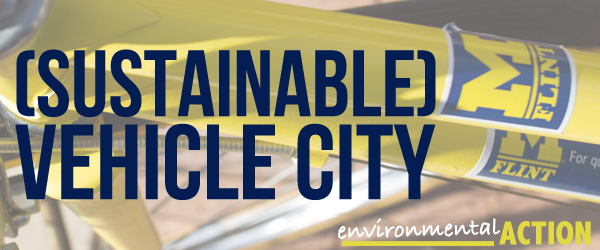UM-Flint Sustainability Survey Key to "Sustainable Vehicle City"

Universities around the world are "greening their ivory towers" by implementing strategies to reduce waste, promote energy efficiency, and cultivate a culture of more than simple environmental awareness to one of real environmental action. At the University of Michigan-Flint, students and faculty are exploring ways to expand sustainability efforts beyond campus, moving Flint beyond its historical "Vehicle City" identity to a future in which it may rightly be called "Sustainable Vehicle City."
At a number of recent campus events students were asked to fill out a survey to gain a foundation of information related to the University of Michigan-Flint community's attitudes towards public transit, bicycling, and walking on and near campus. The entire campus community has been asked to participate in filling out the online survey.
Detailed responses to the survey will gauge how changes such as bicycle racks, bike routes, student fees, parking costs, bus stops, etc. would or would not be conducive to increasing the levels of walking, public transit utilization, and bicycling on and around campus. Results of the survey will facilitate sustainable transportation planning at UM-Flint for years to come.
Campus sustainability efforts fall under the umbrella of the "Go Blue, Live Green" initiative. This initiative sets out to increase environmental sustainability and the general health of students, faculty, and staff at UM-Flint, as well as the larger community. This goal is pursued through various programs and events held on campus, such as a rigorous recycling and energy management campaign, wellness seminars, Earth Day celebrations, bicycle skills training, bicycle program, bicycle share program, a new undergraduate major in Energy and Sustainable Systems offered by the Earth and Resource Science Department, sustainable transportation courses, transportation data collection projects, development of a bicycle working group, and the relatively new Smart Commute Event, to name a few.
Many of the sustainability projects, including the survey, are being spearheaded by assistant professor Greg Rybarczyk in the Earth and Resource Science Department.
"Sustainability doesn't catch on right away, it takes time, but it is hoped that a culture develops where a critical mass of people eventually change their lifestyle, and integrate non-motorized transportation into their lives, our job as stakeholders then, is to provide proper planning and interventions to induce non-motorized traffic and public transit use," noted Rybarczyk.
Related Posts
No related photos.
UM-Flint News
The Office of Marketing & Communications can be reached at mac-flint@umich.edu.